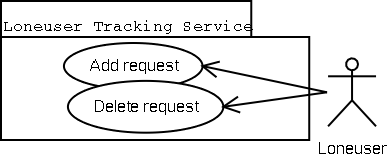Chapter 2. Front end
In order to illustrate the use case packages, we first define actor roles. The following section defines the types of users that access the package tracking service. Then, we look at the types of service packages available.
User roles
There are four types of actors in the system, namely loneusers -- the special case of service users, the data providers and the site administrators.
Clients and loneusers
A client can either log on to the system using private account, manage package tracking requests and account details. Clients not logged on to the system can enter a tracking number with email address or GSM phone number and the notifications are sent when the single parcel passes the shippers hubs. In the latter case a client is acting as a loneuser.
Figure 2-1. Loneusers manipulate tracking requests

Providing the parcel ID, loneusers can also delete tracking requests once they have tracking requests entered unless the parcel has reached its destination (in which case the request is deleted automatically).
Administrators and data suppliers
There are two levels of user types related to the role of administrators.
Users are attached to data suppliers that upload data containing their package IDs. It is thus natural to data suppliers log on to the Tracepack site and manage the users settings. This also means that, after joining two accounts that were attached to two different data suppliers, both of the suppliers have access to the user details. Making data suppliers access their users accounts helps to distribute the task of administering a possibly huge database of user accounts and service instance details.
For the task of creating new data suppliers accounts and manipulating existing ones, we introduce Tracepack administrators who enjoy the top-level access privileges in the system. Additionally, Tracepack site administrators manipulate SMS and Service provider database.